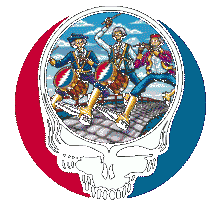Dead profitable? It seems not

From the Financial Times:
Dead profitable? It seems not
By David Honigmann
Until about three weeks ago the Grateful Dead were poster children for intellectual property philanthropy. Now they are vilified in every real or virtual space in which fans gather. How did the Dead so offend the Deadheads?
For three decades or more, the quintessentially Californian band defied the laws of economics. They never sold many albums; they had only one hit single, and that in 1987, long after their 1970s heyday; they were deeply unfashionable. Their keyboard players regularly died. Their music is hard to pigeonhole, veering from folksy, old-time strumming to improvised musique concrète. Yet by the 1990s they had become the biggest-grossing live act in the world: only the death of their singer and guitarist Jerry Garcia, in 1995, could slow their momentum.
The Dead were influential in many ways. They were the house band for Ken Kesey's Acid Tests, and played a crucial role in the growth of the internet. (The WELL, the first, arguably greatest bulletin board on-line community, got its initial impetus from hosting discussions of their music.) John Perry Barlow, a lyricist for the band, helped found the Electronic Freedom Foundation, which campaigns for free speech in the digital age.
The Grateful Dead were caricatured as appealing only to hippies, but hippies come in every guise: some wanted to turn on, tune in and drop out; others thought we were as gods, and might as well get good at it: they were independent and self-sufficient. Some of their biggest fans in the latter category are now big beasts in corporate America. (Don Henley jibed about seeing a "Deadhead sticker on a Cadillac".)
The Dead were distinguished by their attitude to intellectual property. They encouraged tapers to record their concerts, roping off areas for their microphones. "When we're done with the music," they proclaimed, "it's yours." But tapers were expected to trade their recordings without money changing hands. In effect, the Dead enlisted their own fans as promoters. Perhaps this lost them money from reduced sales of studio albums, but they made it up in live concert revenue and merchandising - where they did discourage freelance selling and counterfeiting.
Those who believe inform-ation wants to be free always hailed the Dead as prime exemplars of how the strategy can work. By letting their audience make tapes, they grew a fan base willing to shell out for Jerry Garcia-designed silk neckties.
Until a few weeks ago, more than 1,000 of the Dead's live recordings could be downloaded free from www.archive.org (which maintains a historical record on the web and hosts recordings of lectures, marginalia and a patchy range of music). These varied in quality but were widely downloaded and commented on.
Then, abruptly, without so much as a think-this-through-with-me, the site withdrew the recordings, citing the wishes of the band. Howls of outrage issued from fans. (Compare football supporters who think that buying a ticket week in, week out makes them owners of their club, rather than its customers.) Barlow and Phil Lesh, the band's bassist, publicly dissented from the move; and the rest of the band have backtracked somewhat. For now, audience recordings can again be downloaded, but soundboard recordings (ie those of better technical quality) can only be streamed. So files that compete with the band's own commercial live recordings have been hamstrung.
As that other hippy classic, Seven Laws of Money, puts it, "you can never really give money away": Michael Phillips insists that "by looking at the gift in a larger or longer-term perspective we will see that it is part of a two-way flow". Intellectual property turns out to come at a price after all. Since Garcia's death, the Dead no longer make their money as a live act, so they have to milk their back catalogue of recordings. When they chose to give something away, the expectation was that it would pay off later as monetisable goodwill. Economic gravity has finally brought this long, strange trip down to earth.



2 Comments:
I don't know why but of all the articles I've read, this one seems to make the most sense to me. Maybe it's just all sinking in.
Have a wonderful Holiday!
Peace.................
i agree. i like this one as well...except for the bit about:
"(Compare football supporters who think that buying a ticket week in, week out makes them owners of their club, rather than its customers.)"
that analogy is off the mark. maybe if football fans could bring high-end video recording equipment into the stadiums, tape the games, and then trade their favorites with one another, then it would work as a comparison.
Post a Comment
<< Home